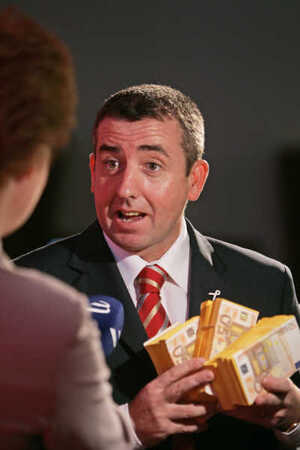The transcript of the first part of yesterday’s extraordinary exchange between Pat Kenny and Ciaran Lynch (above), Labour TD, over the Cyprus deal.
During the interview Lynch quotes economist Paul Krugman.
Not sure if they’re on the same page, to be fair.
Pat Kenny: “yesterday, Minister Simon Coveney assured the Dáil yesterday that there would be no Cypriot-style raid on bank savings here. But, the question: why, if we hold the presidency of the EU at the moment that the deal ever get past the drafting stage? Well, joining me now is the chairman of the Oireachtas finance committee, Labour TD Ciaran Lynch.
Ciaran Lynch: “Good morning”
Kenny: “Ciaran, there was a bit of consternation because the statement from the Irish government at the time was, this is the original deal that was soundly rejected by the Cypriot parliament:’This is a good deal for Cyprus and a good deal for the Eurozone’.”
Lynch: “Well, what happened on Saturday morning when the Irish government made that announcement, Pat. Is that we were welcoming that an agreement appeared to have been reached and that the Cypriot parliament was sitting down to actually work out the finer detail of it, and the agreement of the Irish government was issued in that context. And I would hope, and I suppose that everyone else would hope that, over the coming days we will see a resolution…
Kenny: “Hang on. The point I’m making is that the Irish government’s statement was: “This was a positive development for Cyprus, the Eurozone as a whole and Ireland.” Now this was raiding people’s personal savings. I mean a ‘smash and grab’ of unprecedented proportions. And the Irish Government said ‘this was good for Cyprus, and good for the Eurozone, and good for Ireland’. I mean…like…shocking.”
Lynch: “The first thing to put on the record is that the suggestion and the proposal to put a levy on any deposits in the Cypriot banks is actually something that came from the Cypriot parliament itself. And that needs to be made very, very clear. The structure of what’s actually being proposed here was in two parts. There’s a €10billion package that is coming through Europe and there’s a €6.5billion package that has to be put together by the Cypriot government. Now the issue here is that the EU and the IMF are being very, very clear. They’ve been granted the €10billion to Cyprus, that if the sum was to be increased beyond that, the loan would actually become unsustainable and that would have huge…”
Kenny: “Yeah. The Cypriots had to find the balance of the money.”
Lynch: “Correct.”
Kenny: “But we have Herr Schauble saying, and the Germans are quite outspoken in certain matters and he was outspoken here. He was the one saying: ‘Hang on a second. You can’t go doing this. There was a €100,000 guarantee. This is not a good idea.’ He was the one who spotted contagion and everyone else seemed to give it the nod.
Lynch: “Well, the €100,000 guarantee remains in place and remains in place across every Euro member state, and certainly remains in place here in Ireland. But what we have to look at in the Cypriot government.”
Kenny: “No, hold on, hang on, tell me what you mean by a guarantee. A guarantee for €100,000 seems to me to be sacrosanct if it is a guarantee. Otherwise it’s not a guarantee at all.”
Lynch:“What the guarantee means is if the bank actually collapses in the morning, and the bank is there no longer, that the State will actually guarantee that’s safe or that €100,000 that they have in an account will actually…”
Kenny: “So in the meantime, hang on a second. So, you go along with this principle. Bank of Ireland are not, eh, you know, they’re trading, they don’t seem to be in any danger, AIB the same. And because they’re not insolvent, you could actually come in and take my money.”
Lynch:“What’s happening in Cyprus has…”
Kenny: “No, no, no. That’s the principle that you are espousing.”
Lynch: “No, no, no, Pat you’re confusing two completely different issues here, OK? The issue of the €100,000 guarantee, which is in place in Ireland across the European member states, is to ensure that in the event of those banks actually defaulting, which is not going to happen in Ireland, that the €100,000 is safe. What was proposed in Cyprus was a proposal that came to the Cyprian government, that a levy, on a once-off basis, would actually be applied. Now there are certain difficulties with this…”
Kenny: “No, hang on a second, hang on a second. What you are saying, therefore, this principle, and we’re talking about a principle here, where Bank of Ireland, AIB, etc are not insolvent. But the government is shook for a bit of cash, that it needs money. That because the banks are insolvent, it could go in and take money.
Byrne: “No. Pat, you’re speculating there are you’re completely wrong to put out any suggestion whatsoever that…”
Kenny: “No but if you’re approving of the principle. I mean it’s a principle that shocked everybody.”
Lynch: “What’s happening in Cyprus is a very, very, very unique situation and if you actually look at what’s at the detail of it. The banking crisis in Cyprus is eight times the Cypriot economy. To give that some measurement with regards to the Irish situation: the Irish banking crisis was four times the Irish economy. Another difficulty with the Cypriot issue is the amount of Russian monies that are actually on deposit out there. Approximately 40% of cash held on account in Cyprus is coming from foreign accounts and the vast majority of that is actually Russian. In fact, Paul Krugman over the last couple of days has indicated two specific issues with there. One, is the absence of poor regulatory controls and no laundry protocols there and secondly, he said that if Europe was not to apply some sort of haircut, the banking sector, in effect, what we’d actually be giving out is a bailout to Russian investors. Now surely you don’t want that.”
Kenny: “So, what’s wrong with the Russian investor? I’m sure if a Russian came over here with a few bob, we’d be glad to have him. I mean if you’re talking about mafia investors,say so. But if you’re talking about genuine Russian businessmen and women they’ve as much right. I mean the Morrison Hotel was bought by a Russian businesswoman. What’s wrong with her?”
More to follow
Listen here
Previously: Lest We Forget
The Slow Death Of The European Project





